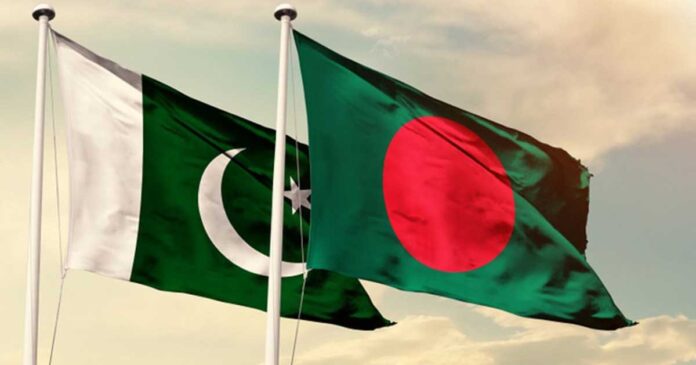Pakistan and Bangladesh have taken significant steps to boost bilateral cooperation with the signing of six Memorandums of Understanding during Deputy Prime Minister and Foreign Minister Muhammad Ishaq Dar’s official visit to Dhaka.
The accords cover a wide range of areas, including the abolition of visa requirements for diplomatic and official passport holders, the establishment of a Joint Working Group on Trade, cooperation between the two countries’ Foreign Service Academies, media collaboration between Associated Press of Pakistan and Bangladesh Sangbad Sangstha, academic and research partnership between the Institute of Strategic Studies Islamabad and Bangladesh Institute of International and Strategic Studies, and the launch of a Cultural Exchange Programme. According to the Ministry of Foreign Affairs, these agreements are expected to institutionalise cooperation in trade, economic linkages, training of diplomats, academic exchanges, media, and cultural ties.
Coinciding with the visit, Islamabad also announced the launch of the “Pakistan-Bangladesh Knowledge Corridor,” a project that will provide 500 scholarships to Bangladeshi students for higher studies in Pakistan over the next five years. One quarter of these scholarships will be dedicated to medicine, while 100 Bangladeshi civil servants will also be trained under the initiative. In addition, Pakistan has decided to raise the number of scholarships under the Pakistan Technical Assistance Program from five to twenty-five.
Dar’s trip, which began on Saturday, marks the first visit by a Pakistani foreign minister to Bangladesh in 13 years. He is also the most senior Pakistani official to travel to Dhaka since 2012. Islamabad has described the development as a “significant milestone” in Pakistan-Bangladesh relations.
On Sunday, Dar held talks with Bangladeshi Foreign Adviser Touhid Hossain. The two sides reviewed the full spectrum of bilateral relations, including high-level exchanges, trade and economic cooperation, humanitarian matters, and people-to-people contacts. They also discussed regional and international issues such as revitalising SAARC, the situation in Palestine, and the Rohingya crisis.
The foreign minister’s visit followed a week of intensified engagement. On Thursday, Commerce Minister Jam Kamal Khan met officials in Dhaka, where both sides agreed to form joint commissions to expand trade and investment. A day later, senior military commanders from the two nations held talks in Pakistan. These developments build on growing ties that saw Pakistan and Bangladesh begin sea trade last year, with government-to-government commerce expanding in February.
During his stay in Dhaka, Dar also met Jamaat-e-Islami Bangladesh chief Dr Shafiqur Rehman, who is recovering from cardiac surgery, and conveyed well wishes on behalf of Prime Minister Shehbaz Sharif.
Dar’s visit comes at a time of shifting regional dynamics following the ouster of former Bangladeshi Prime Minister Sheikh Hasina. The interim government led by Nobel Peace Prize laureate Muhammad Yunus has accused India of backing Hasina’s outlawed Awami League, charges New Delhi has rejected, while Hasina remains in India and continues to refuse to stand trial in Dhaka. Analysts say her removal was a strategic setback for India and has opened the way for closer relations between Pakistan and Bangladesh.




